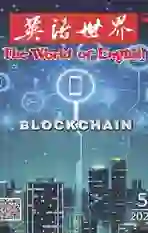Blockchain’s Big Innovation Is Trust, Not Money 区块链的最大创新在信任不在金钱
2020-06-24杰森莱博维茨
杰森?莱博维茨
Its been referred to as a “revolutionary technology” by IBM, and a “once in a generation opportunity” by PricewaterhouseCoopers. But perhaps the most descriptive title came from The Economist when they dubbed blockchain “the trust machine”.
It is a breakthrough in computer science that holds the promise of reducing the cost of establishing and maintaining trust for both individuals and organizations.
“Blockchain” is a relatively new term that refers to a specific type of computer database. The Oxford English Dictionary defines blockchain as “a digital ledger in which transactions… are recorded chronologically and publicly”. The etymology dates back to 2008 when the creator of the cryptocurrency “bitcoin” called its ledger a “blockchain”, or a chain consisting of blocks of transactions.
Since then, there have been many competing versions and iterations1, but most operate on the same premise: they are open-sourced, run 24×7 and continuously update in real-time.
What makes blockchain technology unique and groundbreaking is that its not controlled by any single entity; instead the ledgers are distributed among all parties involved (also referred to as a “distributed ledger”). This means that no central party has ownership of the ledger, therefore no one can individually amend the entries already on a blockchain.
This makes the blockchain an immutable store of information.
Removing intermediaries2
One of the primary values of blockchains in business is the role they assume by disintermediating3 middlemen.
Because blockchains are decentralized and immutable, counterparties can independently transact and verify the data on a ledger without the need to hire costly third parties to perform similar tasks. Often the role of third parties is to add trust and integrity to transactions, especially between unknowns.
For example, in real estate transactions, escrow4 companies act as one of the many third parties who sit between the buyer and seller to collect fees for the service of exchanging funds for documents. On a blockchain, individuals and businesses would be able to transact directly, peer-to-peer.
“Standard practices that normally involve specialists, like title searches, legal, finance, etc will be less needed or in most cases totally unnecessary. [Using blockchains] the speed to transact will be shortened from days/weeks/months to minutes or seconds”, explains Jason Ray, CTO of the Urban Land Institute, a global real estate body.
The application of this technology in real estate will make waves by increasing transparency, expediting5 lengthy processes and overall reducing the costs of transacting.
Achieving trust
Over $1bn of venture capital money has already been invested in blockchain-related companies around the world. Leading-edge businesses and investors across many industries have begun to recognize that this technology holds the key to revolutionizing the way money, assets and securities are transferred, accounted for and reconciled.
The goal is to harness blockchain technology to save time and money for businesses and their customers—the product of which will be increased trust and transparency in many currently opaque industries. One beneficiary will be the financial markets, where the pricing of complex derivative instruments (exotic options6 on securities, equities and commodities), including those on mortgage-backed securities7, contributed to the 2008 financial crisis.
Trust is the key element of blockchain technology. When transactions are executed and settled on a distributed ledger, counterparties dont need to have an established trust relationship. If each participant in the transaction trusts the blockchain itself then they dont need to directly trust each other. This opens up new avenues of customers for businesses operating on blockchains.
Here is a real-world example in the insurance industry:
SafeShare Global is a modern insurance company that has a unique edge: they employ blockchain technology to offer affordable insurance solutions specifically designed for the sharing economy. Companies such as AirBnB and Vrumi8 allow users to rent out space to interested parties, however, this means the hosts need to be comfortable letting complete strangers into their homes.
This is where insurance plays an important role: to protect the hosts from potential liabilities. (It is important to note that typical home insurance policies do not cover individuals or families when using residences as unregistered quasi-hotels, which forces space sharing companies to offer their own insurance.)
Vrumi, a startup launched in 2014, has partnered with SafeShare Global because they cannot afford to self-insure like some of their competitors. Once a Vrumi host and renter are matched, and the host opts-in for insurance through the website, the material information about the policy gets directly uploaded onto a distributed ledger. At this point all logistics are essentially automated as Vrumi, SafeShare, the underwriter and all other parties involved behind the scenes simultaneously receive and can view the time-stamped information about each policy.
The use of a distributed ledger eliminates the need for these companies to employ labor-intensive middle and back offices to handle the details and coordination of each policy. What differentiates this from a typical database is the immutable and distributed aspect of the ledger. No one can amend or duplicate policy information, otherwise fraudulent policies would immediately be visible by all parties running the ledger.
The transparency of this distributed ledger virtually eliminates fraud, which further reduces the costs of doing business for all parties involved. ■
IBM將其称作“革命性技术”,普华永道把它评为“百年一遇的良机”。不过,《经济学人》给出了最贴切的描述,称区块链为“信任机器”。
这是计算机科学的创举,可以预见,无论是个体间还是群体间,信任达成与维护的成本都将由此缩减。
“区块链”是一个相对较新的术语,指一种特定类型的计算机数据库。《牛津英语词典》将区块链定义为“按照时间顺序公开记录交易的……数字分类账本”。词源可追溯到2008年,那时加密货币“比特币”的首创者将它的分类账本称作“区块链”——由交易区块组成的链条。
自此,多种版本和迭代更新竞相出现,但其中大多数符合以下前提:公开源代码、全天候运行、不断实时更新。
区块链技术之所以如此独特、具有突破性,是因为它不受任何单一实体控制;相反,分类账本(也称为“分布式账本”)由所有参与者共享。这意味着没有中心化权威机构拥有分类账的所有权,因此没有任何个体可以单独修改区块链上的已有条目。
这使区块链成为不可篡改的数据库。
去除中介
区块链的主要业务价值之一在于:它能够将中间人非居间化。
由于区块链具有去中心化和不可更改的特点,交易方可以独立进行交易并验证分类账上的数据,无须高价雇用第三方来执行此类任务。通常,第三方的作用是为交易提供诚信担保,尤其是在交易双方互不了解的情况下。
例如,在房地产交易中,过户公正公司是买卖双方间众多第三方之一,收费提供资金换文件的服务。在区块链上,个人和企业将能够直接点对点交易。
“通常由专业人员完成的标准业务(如产权查询、法务、财务等)需求量会降低,或在多数情况下需求为零。[使用区块链后],交易速度将从几天/几周/几个月缩短到几分钟或几秒钟。”国际房地产机构城市土地学会的首席技术官杰森·雷解释道。
这项技术的应用可以提高透明度,缩短冗长流程,最终降低交易成本,在房地产行业引起轰动。
取得信任
全球区块链相关公司已获得超过10亿美元的风险投资。许多行业的领先企业和投资者已开始认识到,区块链技术是变革货币、资产和证券之转移、结算和对账方式的关键。
目标是利用区块链技术为企业及其客户节省时间和金钱,其产品将在许多当前不透明的行业中提高信任度和透明度。金融市场将会从中受益,正是由于(包括抵押贷款证券的)复杂衍生工具(证券、股票和大宗商品的奇异期权)的定价,导致了2008年的金融危机。
信任是区块链技术的关键要素。在分布式账本上进行交易和结算时,交易各方不需要已定的信任关系。如果每个交易参与者都信任区块链本身,那么就不需要相互间的直接信任。这为在区块链上开展业务的企业开辟了新的获客渠道。
以下是保险业的一个真实案例:
SafeShare Global是一家拥有独特优势的现代保险公司:他们使用区块链技术为共享经济提供普通价位的专门保险方案。爱彼迎和Vrumi这样的公司允许用户把自家空间出租给有意向者,不过这意味着房东要忍受完全陌生的人进入自己的家。
这就是保险重要之处:保护房东免受潜在损失。(需要注意的是,普通房屋保单不涵盖个人或家庭把自家住宅作为未登记的准旅馆使用,这就要求空间共享公司自己提供保险。)
Vrumi是成立于2014年的初创公司,之所以和SafeShare Global合作,是因为它无法像某些竞争者那样负担自我保险。Vrumi的房东和租客匹配后,房东在网站上选定保险,保单相关信息就会直接上传到分布式账本上。这一环节所有过程均自动完成,因为Vrumi、SafeShare、保险受理人以及所有幕后相关方都能同时查收每个保单的时间戳信息。
使用分布式账本,公司无须再雇用劳动密集型中介及后勤来处理每单的细节和协调工作。与一般数据库不同的是,该账本不可更改,而且是分布式。没有人能修改或者复制保单信息,而虚假保单会立刻被所有账本相关方察觉。
分布式账本的透明性使欺诈行为几乎无处容身,进一步减少了所有参与者的交易成本。 □
(译者为“《英语世界》杯” 翻译大赛获奖者)
